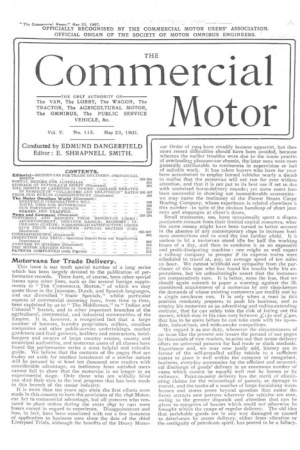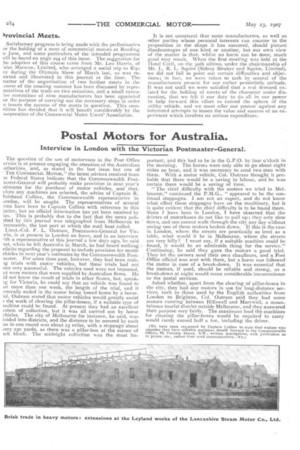Motorvans for Trade Delivery.
Page 1

Page 2

If you've noticed an error in this article please click here to report it so we can fix it.
This issue is our tenth special number of a long series which has been largely devoted to the publication of performance records. There have, of course, been other special issues upon other lines, such as the several foreign supplements to " T1113 COMMERCIAL MOTOR," of which we may quote those in the Japanese, Dutch, and Spanish languages, and our diversified " Show Specials," whilst particular aspects of commercial motoring have, from time to time, been explained by us to "The Middleman," to" Indian and Colonial' buyers, and to other important branches of the agricultural, commercial, and industrial communities of the Empire. It is, however, a recognised fact that a large number of brewers, laundry proprietors, millers, omnibus companies and other public-service undertakings, market gardeners and fruit growers, builders and contractors, hotelkeepers and owners of large country estates, county and municipal authorities, and motorvan users of all classes have found the performance series a most helpful and valuable guide. We believe that the contents of the pages that are to-day set aside for another instalment of a similar nature will be perused by at least ten thousand new readers with considerable advantage, as testimony from satisfied users cannot fail to show that the motorvan is no longer in an experimental stage. Only those who are wilfully blind can shut their eyes to the real progress that has been made in this branch of the motor industry. It is more than ten years ago since the first efforts were made in this country to turn the provisions of the 1896 Motorcar Act to commercial advantage, but all pioneers who ventured to place orders during the years 1897 to 19or were losers except in regard to experience. Disappointment and loss, in fact, have been associated with not a few instances of application to business uses since the date of the third Liverpool Trials, although the benefits of the Heavy Motor car Order of 1944 have steadily become apparent, but thes more recent difficulties Should have been avoided, because whereas the earlier troubles were due to the inane practio of overloading pleasure-car chassis, the later ones were mon generally attributable to remissness in supervision or lad of suitable work. It has taken buyers who have for year been accustomed to employ horsed vehicles nearly a decadi to realise that the motorvan will not run for ever withou attention, and that it is not put to its best use if set to dea with unrevised horse-delivery rounds; yet some users hay, been successful in showing not inconsiderable economies— we may name the testimony of the Patent Steam Carpe Beating Company, whose experience is related elsewhere ii this number—in spite of the obvious handicap of short jour. neys and stoppages at client's doors.
Small tradesmen, too, have occasionally spent a dispro portionate amount from their limited capital resources, wher the same money might have been turned to better accourn in the absence of any contemporary steps to increase business connections and to send the van farther afield. It useless to let a tnotorvan stand idle for half the working hours of a day, and then to condemn it as an expensive and profit-dissipating machine : one might as well expect a railway company to prosper if its express trains were scheduled to travel at, say, an average speed of ten miles an hour. We cannot withhold our sympathy from the purchaser of this type who has found his results belie his expectations, but we unhesitatingly assert that the instances are comparatively rare. It is better, none the less, that we should again commit to paper a warning against the illconsidered acquirement of a motorvan by any shop-keeper the demands of whose existing customers are readily met by a single one-horse van. It is only when a man in this position resolutely prepares to push his business, and to employ his motorvan as an advertising and radius-extending medium, that he can safely take the risk of laying out the money, which may in his case vary between „4.150 and-,e,400, that has to be spent before he can take rank with his up-todate, industrious, and wide-awake competitors.
We regard it as our duty, whenever the circumstances of an issue like the present one insure the perusal of our pages by thousands of new readers, to point out that motor delivery offers no universal panacea for bad trade or slack methods. Experience and, we may now justly add, history are in favour of the self-propelled utility vehicle to a sufficient extent to place it well within the category of recognised, business, everyday accessories for the efficient and economical discharge of goods' delivery in an enormous number of cases which cannot be equally well met by horses or by railways. Point-to-point delivery has the merit of eliminating claims for the miscarriage of parcels, or damage in transit, and -the books of a number of large furnishing warehouses and stores prove beyond question that motor delivery attracts new patrons wherever the vehicles are seen, owing to the greater dispatch and attention that can be given to occupiers of houses which could not otherwise he brought within the range of regular delivery. The old idea that perishable goods are in any way damaged or caused to deteriorate by motor delivery; either from vibration or the contiguity of petroleum spirit, has proved to be a fallacy.
)rovincial Meets.
Satisfactory progress is being made with the preliminarivs or the holding of a meet of commercial motors at Reading n June, and some particulars of the intended programme vill be found on page 294 of this issue. The suggestion for he adoption of this course came from Mr. Leo Harris, of nohn Marston, Limited, who arranged a social trip to Ripey during the Olympia Show of March last, as was rerafted and illustrated in this journal at the time. The natter of the organisation of two further meets in the nurse of the ensuing summer has been discussed by repreentatives of the trade on two occasions, and a small execuive committee of nine manufacturers has been appointed or the purpose of carrying out the necessary steps in order o insure the success of the meets in question. This cornnittee has decided that it will benefit considerably by the 0-operation of the Commercial Motor Users' Association.
It is not unnatural that some manufacturers, as well as other parties whose personal interests run counter to the proposition in the shape it has assumed, should picture disadvantages of one kind or another, but our own view of the matter is that, whilst no harm can be done, much good i-nay result. When the first meeting was held at the Hotel Cecil, on the 3oth ultimo, under the chairmanship of Mr. L. R. L. Squire (Sidney Straker and Squire, Limited); we did not fail to point out certain difficulties and objections; in fact, we were taken to task by several of the manufacturers present for our rather pessimistic attitude. It was not until we were satisfied that a real demand existed for the holding of meets of the character under discussion, that we felt it our duly to do all in our power to help forward this effort to extend the sphere of the utility vehicle, and we must offer our protest against any interested attempts to lessen the value and success of an experiment which involves no serious expenditure.






























